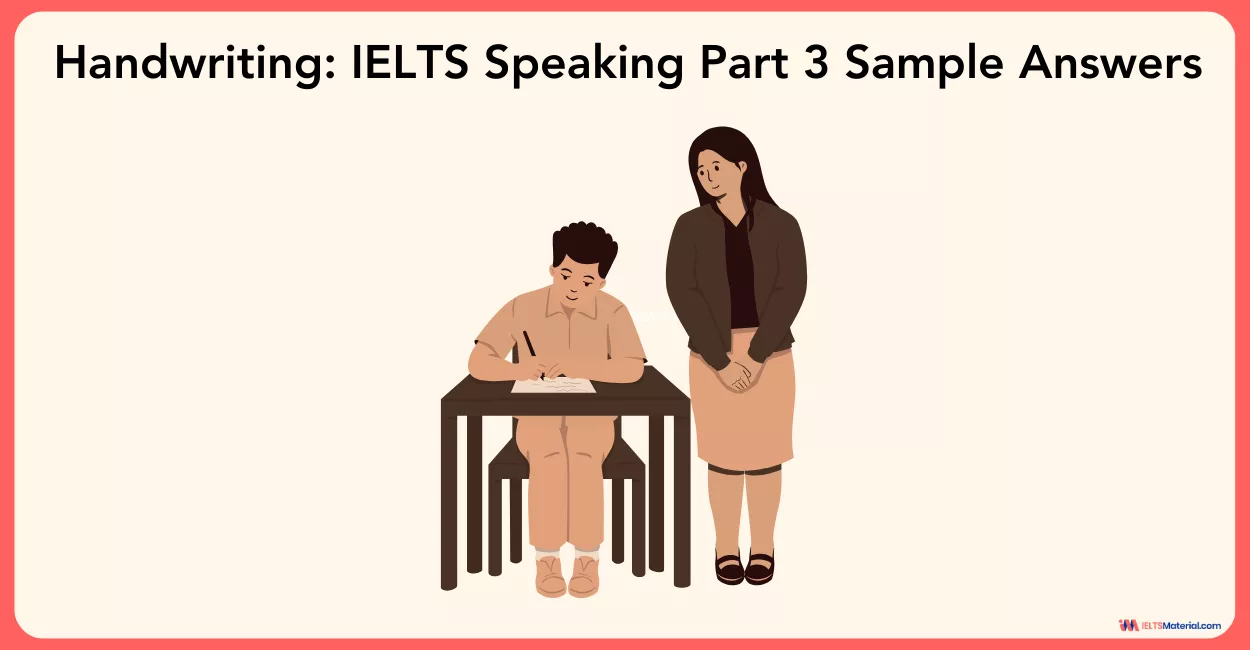Handwriting: IELTS Speaking Part 3 Sample Answers
5 min read
Updated On
-
Copy link
Improve your IELTS Speaking with Handwriting: IELTS Speaking Part 3 Sample Answers. Learn sample answers, key vocabulary, and tips to discuss handwriting’s importance, disadvantages, personality traits, and future trends effectively.
Table of Contents

Limited-Time Offer : Access a FREE 10-Day IELTS Study Plan!
Handwriting may seem like a simple skill, but it has significant importance in both education and daily life. In the IELTS Speaking Part 3, candidates are often asked about handwriting, its advantages, challenges, and its future. Using well-structured responses and relevant vocabulary can help you achieve a higher band score.
This blog provides sample answers for common IELTS Speaking Part 3 questions on handwriting, along with useful vocabulary. By reviewing these answers and practicing with the included idioms and expressions, you can boost your confidence and fluency in the Speaking test.
Handwriting IELTS Speaking Part 3
Below are well-crafted sample responses to help you confidently answer questions. By using these examples, you can improve your ability to articulate clear and relevant answers, enhancing your overall performance in IELTS Speaking exam.
1 Is handwriting still important?
I personally believe that handwriting is crucial for some reasons. It’s a basic tool in many subjects such as doing homeworks, tests or taking notes. So poor handwriting skills or illegible writing can create trouble for students when they study. Handwriting is able to help students memorize everything better than typing. Besides, handwriting is in extricably linked to reading skills .It promotes a child’s visual memory, especially ones having difficulty reading. Mastering handwriting helps children recognize different letters quickly and help them to become good readers
2 What are the disadvantages of handwriting?
I see that the first and foremost disadvantage of handwriting is hard work and time-consuming. When we write very long text, we’ll feel pain of fingers and it takes longer time to finish than typing. Besides, We can save all kinds of documents on computers as they have huge storage and extremely safe with password . The last thing is that handwriting is linked to learning to spell but spell check is a function that all computers have so handwriting doesn’t help with this.
Struggling with IELTS Speaking preparation? Get expert help with a FREE demo session!
3 Is it possible to improve school student’s handwriting once they have established a style?
Well, I do agree with that. In the short term it will almost certainly lead to a reduction in the student’s writing speed. They should take continuously practice of the new writing style and will become faster and automatic..
4 Is being left-handed the cause of the problem?
In my opinion, that’s not a problem. The majority of left-handers write as well as their right-handed peers. Many reseaches also show that lefties have the upper hand in creativity, imagination as their thinking is different from righties. So that’s the reason why there are more and more left- handed people.
5 Are handwriting problems more common in boys?
Yes, I believe so. While girls are careful in everything, boys seem to be more careless. Therefore,girls seem to master good handwriting earlier than boys but boys can catch up if they are given appropriate help.
6 What is the future of handwriting?
Well, I think that the future of handwriting varies from place to place. At big cities , advanced technologies like laptop or smart phone allow people to quickly take note and save documents safely. So people would no longer write longhand notes and penmanship is likely to be lost. On the other hand, handwriting would still enjoy popularity as it helps poor people to write and learn how to spell. Besides, as the saying goes The pen is mightier than the keyboard so I think handwriting’d still be used in the future.
Want a high IELTS Speaking score? Begin with our Comprehensive IELTS Speaking Band 8 Preparation Course!
7 Do you think that handwriting express personality?
Yes, I do. I suppose that each person has their own writing style so the way they write also express who they are. For instance, If someone writes quickly they are impatient and dislike delays or time wasters but slower writers are calm and persevere. So having good handwriting is really important to impress others and people should train writing carefully.
Handwriting IELTS Speaking Part 3 Vocabulary
Vocabulary is crucial for IELTS Speaking Part 3 as it enables you to express nuanced ideas clearly and confidently, ensuring you can discuss complex topics with precision and fluency. Following are some IELTS Speaking vocabulary words used in the "Handwriting: IELTS Speaking Part 3 Sample Answers."
- Visual memory: The ability to remember or recall information
Eg: The doctor gave some medicines to improve the child’s visual memory - Memorize: commit to memory , learn by heart
Eg: She cannot memorize anything. - Left-handers: a left handed person
Eg: The class had some left handers - Penmanship: the art or skill of writing by hand .
Eg: Penmanship is on the decline - Time wasters: if you say that someone or something is a time waster.
Eg: The toy is total time waster for kids - Persevere: continue in a course of action even in the face of difficulty or with little or no indication of success.
Eg: There are lots of people who persevere and succeed
How to Use These Sample Answers to Boost Your IELTS Speaking Score?
- Fluency: Practice answering these questions aloud, aiming for smooth and natural speech.
- Vocabulary: Use the highlighted words naturally in your answers.
- Grammar: Focus on complex sentence structures, such as conditionals and relative clauses.
- Personality: Add personal opinions or examples to make answers sound authentic.
Join Our Free Webinars for valuable tips to elevate your IELTS Speaking preparation!
Mastering handwriting-related questions in IELTS Speaking Part 3 can significantly improve your confidence and score. By practicing these sample answers, using the vocabulary provided, and including personal examples, you can sound fluent, coherent, and well-prepared. Remember, examiners look for clear ideas, relevant examples, and natural language. Using these tips will help you express opinions, discuss advantages and disadvantages, and even reflect on personality traits through handwriting, boosting your overall IELTS Speaking performance.
Practice IELTS Speaking Part 3 Questions with Answers
Would you like to know the set of follow-up questions that might help you answer the Speaking part 3? Here is the list of possible questions that might be asked for every cue card question. We’ve also included answers to the questions. Below is a list of the most common topics which you might encounter in the exam.
Also Check:
Below are some additional speaking practice tests to help you kick-start your IELTS Speaking preparation:
- 50 Recent IELTS Speaking Topics for Part 2 and 3 for IELTS 2025
- 151 IELTS Multilevel Speaking Part 2 & 3 Topics with Model Answers
- IELTS Speaking Recent Actual Tests with Suggested Answers for IELTS 2025
- 40 IELTS Speaking Part 2 Tips, Questions and Band 9 Sample Answers PDF Download
- Recent IELTS Speaking Topics Part 2 & 3 with Model Answers

Start Preparing for IELTS: Get Your 10-Day Study Plan Today!
Recent Articles



Kasturika Samanta

Prity Mallick




Post your Comments